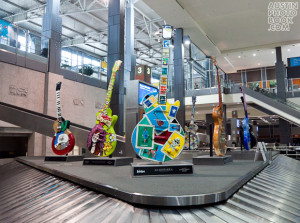Live Music C apital of the World. It’s Austin’s official motto, but what does it really mean? Is it realistic? Aspirational? Simply nostalgic? According to musician Phil Ajjarapu, Austin could lose its grip on that title due to a lack of affordable housing. A member of Austin Music People, Ajjarapu tells us housing costs are a major reason why he’s considering taking his show on the road, for good. Click below to watch his story.
apital of the World. It’s Austin’s official motto, but what does it really mean? Is it realistic? Aspirational? Simply nostalgic? According to musician Phil Ajjarapu, Austin could lose its grip on that title due to a lack of affordable housing. A member of Austin Music People, Ajjarapu tells us housing costs are a major reason why he’s considering taking his show on the road, for good. Click below to watch his story.
What is reality is that the creative community is a critical part of the culture of Austin and its economy. According to the 2009 CreateAustin Cultural Master Plan, the creative sector generates more than $2.2 billion in economic activity and $48 million in local tax revenue. The local music industry alone employs nearly 8,000 people and generates nearly $10 million in local tax revenue.[1]
Not surprisingly, one of Imagine Austin’s priority programs is to “grow and invest in Austin’s creative economy.” Another one of the priority programs – and perhaps the most closely related – is to “develop and maintain household affordability throughout Austin.” If we want to keep Austin creative, we need to make sure Austin has enough affordable housing options. In this Keep Austin Affordable feature, Ajjarapu shares his sobering view of what’s at stake.
As Phil mentioned, other cities have prioritized affordable housing for the creative class with nationally-recognized successes.
Arbor Artists Lofts – a 21-unit affordable housing development for working artists in Lancaster, California – received the 2010 American Institute of Architects (AIA)/HUD Secretary Award for Creating Community Connection. In addition to providing quality affordable housing for the creative community, the project catalyzed the redevelopment of the downtown area.
New Orleans Habitat’s Musicians’ Village is a nationally-recognized musicians’ community that was developed in the wake of Hurricane Katrina. The Musicians’ Village consists of 72 single-family homes, five duplexes designed for the elderly, and the Ellis Marsalis Center for Music. The Marsalis Center for Music include performance spaces, a recording facility, and educational classroom spaces.
Efforts have been made locally as well, most notably Capital Studios. Developed by Foundation Communities in 2014, Capital Studios provides 135 efficiency-style units in downtown Austin. Rents range from $399 – $665/month and include all utilities. Ten of the 135 units are set aside for working musicians.
If Austin is committed to being the “Live Music Capital of the World,” which includes keeping our musicians in town, we need to do more. Otherwise, we will have more people singing about leaving Austin than actually singing in Austin.
[1] Austin Creative Sector Economic Impact UPDATE, February 2012, page 1.
Brown-Haired pounding old man
One Coment, RSS